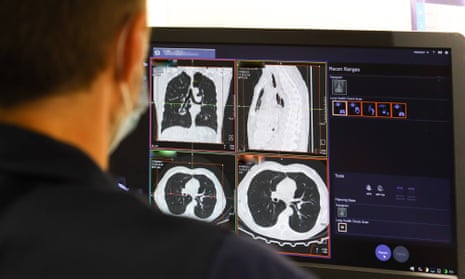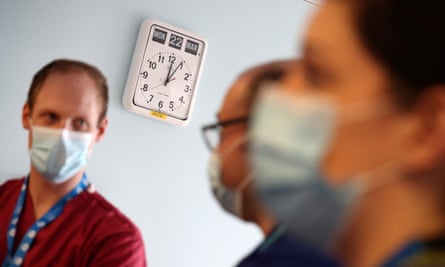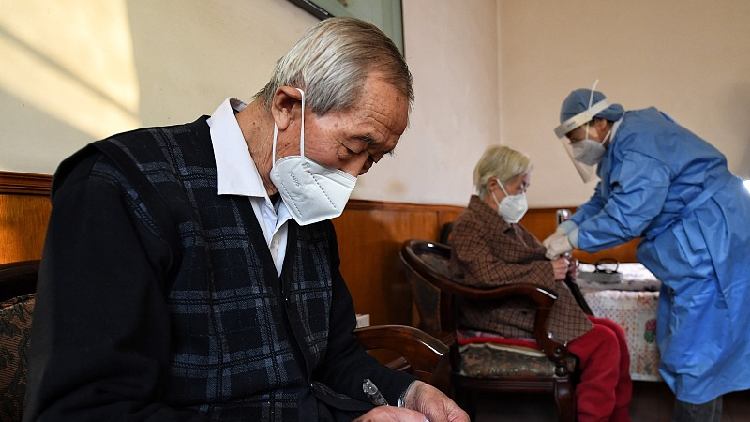Covid’s hidden epidemic: up to a million cancer cases missed in Europe
Covid’s hidden epidemic: up to a million cancer cases missed in Europe

Cancer care has been set back years – it must be put back on the agenda urgently
- Devi Sridhar is chair of global public health at the University of Edinburgh

You almost certainly know someone who has died of cancer before their time. Perhaps you’re even a cancer survivor yourself. Lymphoma and leukaemia killed my father at 49, after several years battling them. My best friend’s mother has survived breast cancer, but the fact that it might return is a lurking anxiety in her mind. Cancer is a leading cause of death worldwide, and accounts for nearly one in six deaths. The good news before Covid-19 was that countries across the world, even in low-income regions, had improved their diagnosis and treatment capability, and cancer survival outcomes were improving. Things were getting better.
But the pandemic has reversed these gains. A report from the Lancet Oncology Commission, examining 44 European countries, notes that the pandemic has resulted in late cancer diagnosis, delayed intervention, disruption in treatment and many deaths, due to Covid-19, among cancer sufferers. This is largely a result of health services being overwhelmed or repurposed and of too many infections and Covid hospital admissions, leading to long national lockdowns in some countries. The report estimates that as many as a million cancer diagnoses may have been missed in Europe during that time.
The pandemic showed us that healthcare resources are finite, and so when demand associated with one disease increases, it affects all patients. In Britain, due to the large first and second waves, the NHS effectively became the Covid Health Service for much of 2020. And this is likely to have had a detrimental impact on cancer outcomes: another Lancet study estimated in 2020 that delayed diagnosis and treatment in England could increase the amount of breast, colorectal and lung cancers by up to 9.6%, 16.6% and 5.3%, respectively, in the coming years. This is largely due to screening services being disrupted and people – even with worrying symptoms – not coming forward to primary care. Of course, countries that were able to contain Covid-19 quickly and limit their patient numbers in 2020 managed to keep their health services running relatively well.
There is a term for this, taken from the 2014 Ebola outbreak in west Africa, when women died during childbirth because healthcare facilities were closed and childhood vaccination schedules disrupted: the “uncounted dead”. This was how Unicef referred to the people who died from the indirect impacts of Ebola but needed to be taken into account as casualties of the outbreak. We are now facing one of what will probably be many hidden and uncounted costs of Covid-19.

As part of the pandemic recovery, public health experts are calling for specific actions to reduce the individual risk of developing cancer and increase survival for those who are diagnosed. This requires health systems to initiate awareness-raising and proactive measures. We can’t just pretend that the last few years didn’t happen, and let the huge number of new patients slide into the existing system. We have to put cancer back on the agenda, including the priority given cancer patients by our health services.
Getting cancer is the result of a complex interaction between genetics, environmental factors, infections and age. The WHO estimates that a third of the world’s cancer deaths are due to smoking tobacco, being overweight/obese, having a diet low in fruits and vegetables, being physically inactive and drinking excessive alcohol. And the incidence of cancer rises dramatically with age, due to the buildup of risks across a lifetime; the body’s ability to repair itself reduces the older we get.
And then there’s just bad luck (combined with genetics and unexplained factors): my father didn’t smoke, didn’t drink, exercised regularly and ate a diverse vegetarian diet. He wasn’t overweight or unhealthy. He actually was an oncologist, and ended up being cared for by his colleagues and dying on the ward he once oversaw. So it’s worth recognising that sometimes, there’s only so much we can do to avoid disease. There’s no role for shame, guilt or blame in illness.
How best, then, to reduce the chances of getting cancer and dying from it? At an individual level, public policy needs to continue to focus on making healthier choices more affordable and accessible: for instance, making it easier for people to walk or exercise with safe cycling paths, and ensuring that fruit and vegetables are subsidised and available. Getting vaccinated against HPV and hepatitis B is also important if you’re in a high-risk group. And we need more awareness about the importance of screening. If you or someone you love are worried about changes in your health – such as weight loss, extreme fatigue, blood in your urine or stool, a persistent cough or lumps – get them checked without delay.
Early diagnosis is important because it improves survival outcomes. In England, more than 90% of people survive bowel, breast and ovarian cancer for at least five years if diagnosed at the earliest stage. This allows treatment to start earlier, before the cancer has spread through the body. Yet even with a cancer diagnosis, the NHS is struggling to provide treatment within the current 62-day target time: 36% of patients waited longer than 62 days in England, 21% in Scotland and 43% in Wales. The main bottleneck is staff shortages, which the Covid-19 pandemic has made more acute. Again, this points to the need for investment in the NHS – in not just infrastructure, but also the workforce.
The challenge is acute for the UK and devolved governments now: we must make cancer a priority, and make up for the years lost during the pandemic.
-
Prof Devi Sridhar is chair of global public health at the University of Edinburgh



